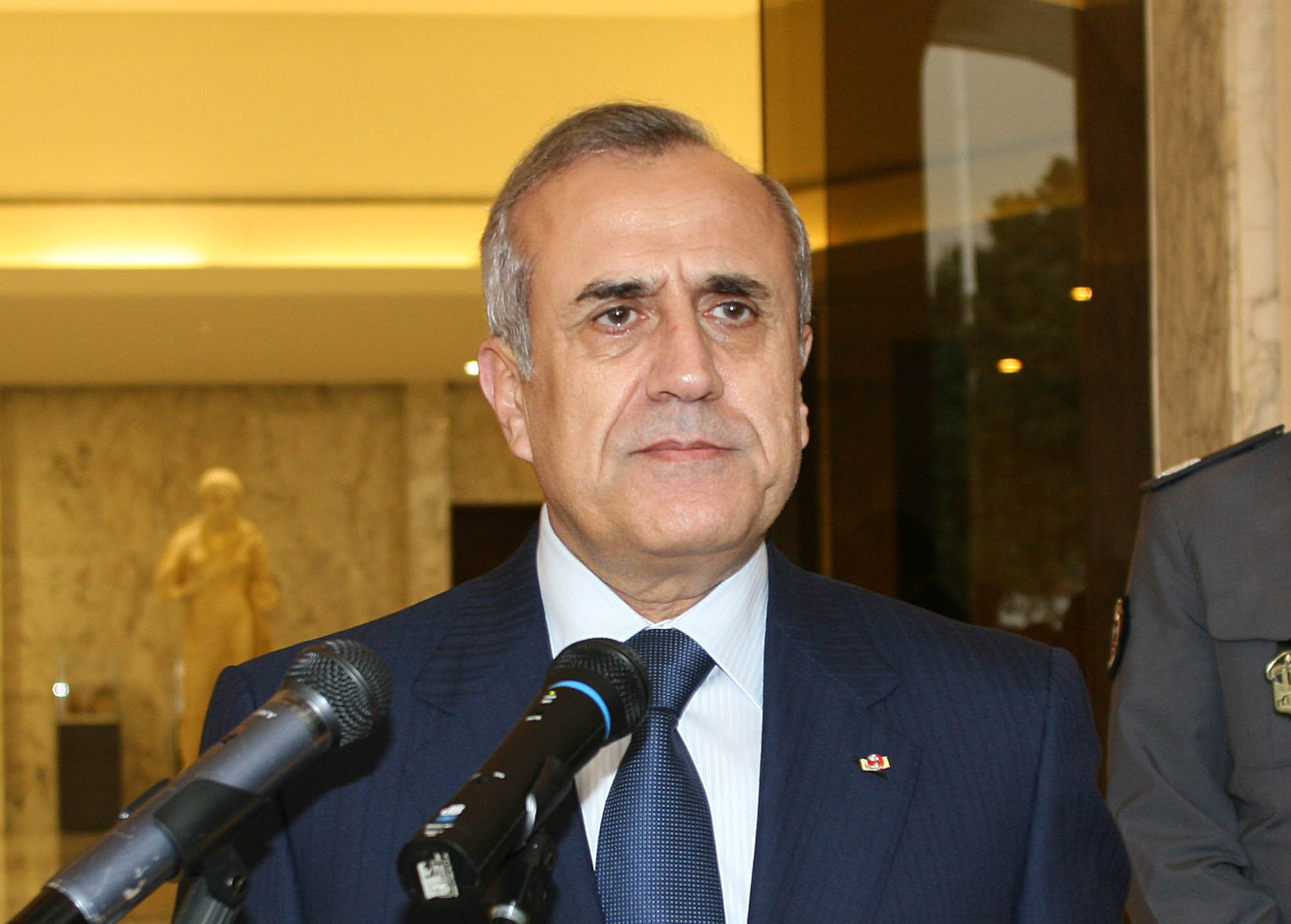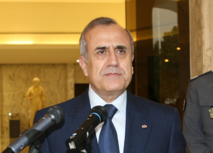Over the past two months parliament convened five times to try to elect a successor to Sleiman but failed each time due to a lack of quorum.
Lebanon's political paralysis is mainly due to a deep political rift between two rival camps over the conflict in Syria, the powerful neighbour that dominated Beirut for 30 years until 2005.
The March 14 coalition, led by Sunni leader and ex-prime minister Saad Hariri and Christian presidential candidate Samir Geagea, opposes the Syrian regime of President Bashar al-Assad.
March 14 has the backing of Washington and Middle East kingpin Saudi Arabia.
The other camp is led by the Shiite movement Hezbollah which backs the Assad regime and has been fighting alongside loyalist troops against the mostly Sunni rebels seeking to topple the government.
The Hezbollah camp, also known as March 8, is allied with Tehran and with Christian leader Michel Aoun, who has expressed the desire to become Lebanon's next president.
In his farewell speech Saturday to MPs, ministers and diplomats at the presidential palace, Sleiman called on "parliament to elect a president without delay, or else it will bear responsibility for the dangers that a void in this post brings."
A presidential vacuum constitutes "a threat" to stability he warned, "especially if this vacuum is intentional".
Lebanon was without a president for months in 1988, during the country's civil war, and again in 2007 due to political divisions before Sleiman was finally elected.
Political scientist Ghassan Azzeh said it might take "months" for parliament to reach consensus on a candidate for the presidency, blaming MPs for their failure to "manage their own affairs."
March 14 has accused the Hezbollah camp of boycotting parliament to ensure that quorum was not while March 8 candidate Aoun has bemoaned the lack of consensus for his presidential bid.
Neither camp has absolute majority in parliament to tip the balance.
- Foreign influence -
The choice of who becomes president in Lebanon is usually dictated by foreign powers, especially Syria, even after it withdrew its troops in 2005.
Damascus continues to have an influential role in Lebanon through its ally Hezbollah, the only group to have refused to hand in its weapons since the end of the 1975-1990 civil war.
The job of president is highly symbolic and, in line with a decades-long unwritten agreement, it is held by a Christian while the prime minister is a Sunni and the speaker of parliament Shiite.
Azzeh, who teaches political science at the Lebanese University, said ties must improve between regional rivals Iran and Saudi Arabia, who have influence in Lebanon, to help the election of a president in Beirut.
Saudi Arabia and Iran are divided over a raft of regional issues, particularly the three-year war in Syria. Azzeh said the United States must sponsor a dialogue between them to spur the Lebanese election.
Lebanese newspapers, meanwhile, voiced concern over a drawn out presidential vacuum.
Pro-Hezbollah daily As-Safir said "the vacuum has become a reality" while pro-March 14 An-Nahar newspaper wrote: "The palace and the Republic sink together in a presidential vacuum."
"The best scenario for Hezbollah is for there to be a presidential void, or a president under its control," MP Antoine Zahra, from Geagea's Lebanese Forces party, told AFP.
Hezbollah chief Hassan Nasrallah is expected to discuss the presidential vacuum in a speech on Sunday.
Meanwhile Sleiman, in his farewell speech, urged Hezbollah "to withdraw without hesitation" its fighters from Syria and insisted that the army should be Lebanon's only armed force.
------------------------------------------------------------------------
Lebanon's political paralysis is mainly due to a deep political rift between two rival camps over the conflict in Syria, the powerful neighbour that dominated Beirut for 30 years until 2005.
The March 14 coalition, led by Sunni leader and ex-prime minister Saad Hariri and Christian presidential candidate Samir Geagea, opposes the Syrian regime of President Bashar al-Assad.
March 14 has the backing of Washington and Middle East kingpin Saudi Arabia.
The other camp is led by the Shiite movement Hezbollah which backs the Assad regime and has been fighting alongside loyalist troops against the mostly Sunni rebels seeking to topple the government.
The Hezbollah camp, also known as March 8, is allied with Tehran and with Christian leader Michel Aoun, who has expressed the desire to become Lebanon's next president.
In his farewell speech Saturday to MPs, ministers and diplomats at the presidential palace, Sleiman called on "parliament to elect a president without delay, or else it will bear responsibility for the dangers that a void in this post brings."
A presidential vacuum constitutes "a threat" to stability he warned, "especially if this vacuum is intentional".
Lebanon was without a president for months in 1988, during the country's civil war, and again in 2007 due to political divisions before Sleiman was finally elected.
Political scientist Ghassan Azzeh said it might take "months" for parliament to reach consensus on a candidate for the presidency, blaming MPs for their failure to "manage their own affairs."
March 14 has accused the Hezbollah camp of boycotting parliament to ensure that quorum was not while March 8 candidate Aoun has bemoaned the lack of consensus for his presidential bid.
Neither camp has absolute majority in parliament to tip the balance.
- Foreign influence -
The choice of who becomes president in Lebanon is usually dictated by foreign powers, especially Syria, even after it withdrew its troops in 2005.
Damascus continues to have an influential role in Lebanon through its ally Hezbollah, the only group to have refused to hand in its weapons since the end of the 1975-1990 civil war.
The job of president is highly symbolic and, in line with a decades-long unwritten agreement, it is held by a Christian while the prime minister is a Sunni and the speaker of parliament Shiite.
Azzeh, who teaches political science at the Lebanese University, said ties must improve between regional rivals Iran and Saudi Arabia, who have influence in Lebanon, to help the election of a president in Beirut.
Saudi Arabia and Iran are divided over a raft of regional issues, particularly the three-year war in Syria. Azzeh said the United States must sponsor a dialogue between them to spur the Lebanese election.
Lebanese newspapers, meanwhile, voiced concern over a drawn out presidential vacuum.
Pro-Hezbollah daily As-Safir said "the vacuum has become a reality" while pro-March 14 An-Nahar newspaper wrote: "The palace and the Republic sink together in a presidential vacuum."
"The best scenario for Hezbollah is for there to be a presidential void, or a president under its control," MP Antoine Zahra, from Geagea's Lebanese Forces party, told AFP.
Hezbollah chief Hassan Nasrallah is expected to discuss the presidential vacuum in a speech on Sunday.
Meanwhile Sleiman, in his farewell speech, urged Hezbollah "to withdraw without hesitation" its fighters from Syria and insisted that the army should be Lebanon's only armed force.
------------------------------------------------------------------------









 Home
Home Politics
Politics











